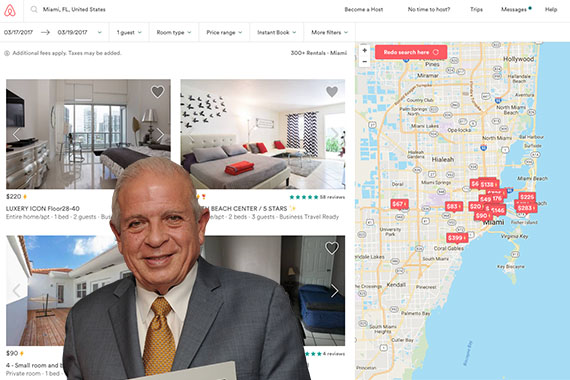After hours of public comments and debate, city of Miami commissioners passed a resolution that effectively reiterates existing regulations on short-term rentals, with an amendment that would have the city look into suing short-term rental platforms like Airbnb.
Hosts, super hosts and proponents of the short-term rental platform spoke out against Miami Mayor Tomas Regalado’s resolution to affirm and “vigorously” enforce existing short-term rental regulations. Under the city’s current zoning code, daily and weekly rentals of residential properties are illegal.
South Florida is Airbnb’s fourth largest market in the U.S., and the city of Miami has about 3,500 hosts on Airbnb. “We want to be regulated … but more importantly we want to be recognized under the law,” Airbnb spokesperson Tom Martinelli said. The company said in a recent report that its hosts in South Florida took in $160 million in 2016.
Since February, Regalado has floated proposals to clamp down on property owners who use the popular web-based short-term rental service to illegally rent out homes to tourists. “What we’re trying to do here is to send a clear message to the residential neighborhoods that the city is with them,” said Regalado, who believes daily rentals create a nuisance in the city’s residential neighborhoods.
“I agree that Airbnb, VRBO, short-term rentals, whatever you want to call it, is the death of the single-family neighborhood,” commissioner Keon Hardemon added.
Commissioners were open to working with Airbnb and other platforms, but said that the proposed resolution was about only enforcing existing rules, especially when it pertains to single-family neighborhoods. Frank Carollo, a commissioner, added an amendment to the resolution that allows the city to also look into suing Airbnb and similar platforms for allowing hosts to rent their properties where they are already illegal.
Francis Suarez and Ken Russell voted against the resolution.
“In essence, our vote today is not changing anything but taking the temperature on this dais on how we feel about short-term rentals in this city,” commissioner Ken Russell said. His district has about 2,500 Airbnb hosts, Martinelli said.
Earlier this week, Miami-Dade County reached an agreement with Airbnb to collect and remit taxes on behalf of its roughly 6,800 hosts in the county. The county commission still has to approve the deal, which could bring in $8 million, based on Airbnb’s revenue in 2016. The city of Miami Beach hasn’t been so kind to short-term rentals, upping the fines to $20,000 against homeowners who illegally rent their properties through Airbnb.
Airbnb, valued at $31 billion, brought in $1 billion during its latest round of fundraising, 10 percent of which came from China’s sovereign wealth fund, the China Investment Corporation. CEO Brian Chesky said last week that the company is on pace to launch an initial public offering in 2018.
